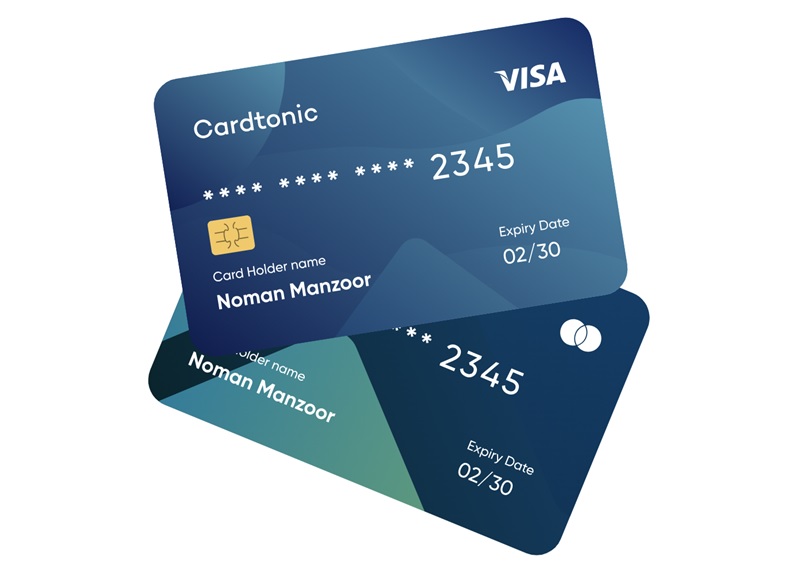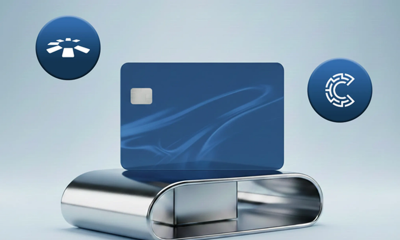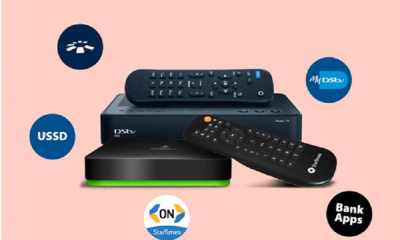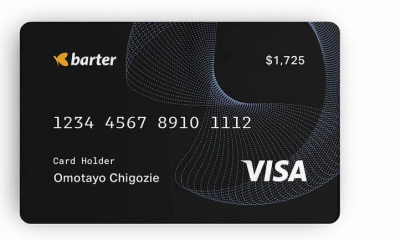Economy
How To Pay For Amazon Prime Subscription In Nigeria

Struggling with Amazon Prime payments in Nigeria? Find out how virtual cards and gift cards can solve your payment issues.
Settling down to watch your favourite movie after a long day – isn’t that just the best feeling? But for movie lovers in Nigeria, getting access to Amazon Prime’s vast library can be a real headache. You’re all set to subscribe, but then bam! Your Nigerian debit card gets rejected. Frustrating, right?
It’s a common problem. Most Nigerian bank debit cards don’t work smoothly for international transactions, leaving you stuck on the payment page. But don’t worry, your movie night isn’t cancelled just yet. There are ways around this obstacle, and you’re about to discover them.
In this guide, we’ll walk you through two reliable methods to pay for your Amazon Prime Subscription in Nigeria without using your debit card. Let’s get started!
2 Ways You Can Pay For Amazon Prime Subscription In Nigeria
Struggling to pay for Amazon Prime in Nigeria? Don’t stress! You’ve got two solid options: using a virtual dollar card or an Amazon gift card. Both work great when your local cards don’t cut it.
- Use a Virtual Dollar Card:
Virtual dollar cards are pretty handy for online payments, especially when you’re dealing with international sites. They work just like regular cards, but they’re all digital.
The cool thing about these cards is that you can load them up with dollars, which makes paying for Amazon Prime a breeze. They’re safer, too, since you’re not putting your main bank details out there.
Need one? Check out Cardtonic. They offer virtual dollar cards that will resolve your Amazon payment issues quickly.

- Use an Amazon Gift Card:
Amazon gift cards are another great way to get around payment problems. You buy a card loaded with a specific amount, then use that to pay for your Prime subscription.
The best part? You don’t need a credit card or bank account to use them. Just punch in the code, and you’re good to go. They’re also great if you want to keep tabs on how much you’re spending on streaming.
And here’s the kicker – you can get these easily in Nigeria through Cardtonic. No need to jump through hoops to pay your Prime subscription.
How To Pay On Amazon Using A Cardtonic Virtual Dollar Card
Paying for Amazon Prime with a Cardtonic virtual card is a breeze. Just sign up on Cardtonic, get your virtual card, head to Amazon, pick your plan, and use your new card details to pay. Easy peasy!
- Sign up on Cardtonic:
Visit Cardtonic’s website and create an account. It’s quick and straightforward.
- Get your virtual dollar card:
Once you’re in, navigate to the virtual card section and request your card. You will need to verify your identity, but it’s usually a breeze.
- Fund your card:
Add some dollars to your new virtual card. Remember to load enough for your Amazon Prime subscription.
- Go to Amazon:
Open up Amazon’s website and navigate to the Prime subscription page.
- Choose your plan:
Pick the Prime plan that suits you best. Monthly or annual – it’s up to you.
- Enter payment details:
When it’s time to pay, select “Credit or Debit Card” as your payment method.
- Use your virtual card info:
Fill in the card details from your Cardtonic virtual dollar card. Double-check everything to make sure it’s correct.
- Confirm and enjoy:
Hit that “Confirm” button, and voila! You’re now an Amazon Prime member. Time to start binging!
How To Pay On Amazon Using Amazon Gift Card
Using a Cardtonic Amazon gift card for Prime is super easy. First, buy an Amazon gift card from Cardtonic. Then, log into Amazon, go to your account, redeem your gift card, head to Prime, choose your plan, and pay with your gift card balance. Simple as that!
- Get your gift card:
First things first, buy an Amazon gift card from Cardtonic. They’ve got different denominations, so pick one that covers your Prime subscription.
- Log into Amazon:
Head to Amazon’s website and sign in to your account. Don’t have one? It only takes a minute to set up.
- Redeem your gift card:
Look for “Account & Lists” at the top of the page. Click on it, then find “Gift cards” in the dropdown menu. Enter your gift card code and hit “Apply to your balance”.
- Navigate to Prime:
Once your gift card is added, go to the Amazon Prime page.
- Choose your plan:
Decide whether you want a monthly or annual subscription. Remember, the annual plan often works out cheaper in the long run.
- Select payment method:
When you get to the payment page, you should see your gift card balance as a payment option. Select it.
- Confirm your subscription:
Double-check everything looks right, then hit that “Confirm” button.
Congratulations! You’re now a Prime member. Time to explore all those movies and shows you’ve been missing out on.
Note: If your gift card doesn’t cover the full amount, you might need to add another payment method for the difference. But don’t worry – Amazon will guide you through it if that happens.
Frequently Asked Questions About Paying For Amazon Subscription In Nigeria
- How Much Is An Amazon Prime Subscription In Nigeria?
As of now, an Amazon Prime subscription costs $14.99 per month or $139 per year. This price is in USD because Amazon Prime is billed in US dollars globally.
For the latest pricing and possible discounts, it’s best to check directly on the Amazon Prime subscription page.
- Does Amazon Accept Nigerian Debit Cards?
Generally, no. Most Nigerian debit cards don’t work for international transactions on Amazon. That’s why we’ve discussed alternative payment methods like virtual dollar cards and gift cards.
- Which Is Better, Netflix Or Amazon Prime?
It depends on what you’re after. Netflix has a wider selection of TV shows, while Amazon Prime offers more movies and comes with additional perks like free shipping on Amazon purchases. Try both and see which suits you better.
- Where Can I Buy Amazon Gift Cards In Nigeria?
The easiest way to buy gift cards online, including Amazon gift cards, is through platforms like Cardtonic. They offer a secure and convenient way to purchase digital gift cards right from your phone or computer.
- Can You Pay For Prime Video With Airtime?
No, unfortunately, you can’t pay for Amazon Prime Video directly with airtime. Amazon doesn’t currently offer this payment option in Nigeria.
Conclusion
So there you have it! Paying for Amazon Prime in Nigeria doesn’t have to be a headache anymore. Whether you choose to go with a virtual dollar card or an Amazon gift card, Cardtonic has got you covered.
They’re your one-stop shop for both options, making the whole process a breeze. Why not head over to Cardtonic now and get yourself set up?
In no time, you’ll be kicking back and enjoying all the great content Amazon Prime has to offer. Happy streaming!
Economy
Seven Price Gainers Boost NASD OTC Bourse by 2.19%

By Adedapo Adesanya
Seven price gainers flipped recent declines at the NASD Over-the-Counter (OTC) Securities Exchange, raising the alternative stock market by 2.19 per cent on Friday.
According to data, the market capitalisation added N51.24 billion to end N2.389 trillion compared with the previous day’s N2.338 trillion, while the NASD Unlisted Security Index (NSI) climbed 85.65 points to close at 3,994.32 points, in contrast to the 3,908.67 points it ended a day earlier.
Business Post reports that the advancers were led by MRS Oil Plc, which improved its value by N13.00 to N200.00 per share from N187.00 per share, FrieslandCampina Wamco Nigeria Plc gained N7.40 to settle at N91.55 per unit versus the previous day’s N84.15 per unit, Central Securities Clearing System (CSCS) Plc appreciated by N6.08 to N71.00 per share from N64.92 per share, Afriland Properties Plc added 66 Kobo to finish at N17.17 per unit versus N16.51 per unit, IPWA Plc rose 37 Kobo to N4.15 per share from N3.78 per share, First Trust Mortgage Bank Plc grew by 11 Kobo to N1.20 per unit from N1.09 per unit, and Food Concepts Plc went up by 10obo to N3.70 per share from N3.60 per share.
On the flip side, there were two price losers led by Geo-Fluids Plc, which depreciated by 28 Kobo to N3.32 per unit from N3.60 per unit, and Industrial and General Insurance (IGI) Plc dropped 5 Kobo to sell at 45 Kobo per share from 50 Kobo per share.
Yesterday, the volume of trades went down by 92.0 per cent to 3.7 million units from 45.8 million units, the value of transactions fell by 59.4 per cent to N84.5 million from N208.2 million, while the number of deals went up by 7.7 per cent to 42 deals from 39 deals.
CSCS Plc remained the most traded stock by value (year-to-date) with 32.6 million units exchanged for N1.9 billion, trailed by Geo-Fluids Plc with 119.6 million units valued at N470.3 million, and Resourcery Plc with 1.05 billion units traded at N408.6 million.
Resourcery Plc closed the day as the most traded stock by volume (year-to-date) with 1.05 billion units sold for N408.7 million, followed by Geo-Fluids Plc with 119.6 million units worth N470.3 million, and CSCS Plc with 32.6 million units worth N1.9 billion.
Economy
FX Demand Worries Weaken Naira to N1,346/$1 at Official Market

By Adedapo Adesanya
The Naira weakened further against the United States Dollar in the Nigerian Autonomous Foreign Exchange Market (NAFEX) on Friday, February 20, by N4.97 or 0.37 per cent to N1,346.32/$1 from the N1,341.35/$1 it was transacted on Thursday.
Heightened FX demand tilted the market toward the downside yesterday, exerting upward pressure on rates despite efforts by the Central Bank of Nigeria (CBN) to stabilise the foreign exchange market.
Also in the official market, the domestic currency depreciated against the Pound Sterling during the session by N9.39 to sell for N1,815.25/£1 versus the previous day’s N1,805.86/£1, and lost N7.33 against the Euro to close at N1,584.62/€1 compared with the preceding session’s N1,577.29/€1.
The story was not different for the Nigerian Naira at the GTBank FX desk, where it depleted against the Dollar by N7 on Friday to quote at N1,356/$1 versus the N1,349/$1 it was sold a day earlier, but remained unchanged in the black market at N1,370/$1.
It was observed that risky sentiment among Foreign Portfolio Investors (FPIs) contributed to the FX market, amid fears of hot money flight due to capital gains tax and other factors.
As for the cryptocurrency market, it was mostly green yesterday in reaction to a Supreme Court verdict dismissing a fresh 10 per cent global levy by President Donald Trump.
The apex court on Friday described Mr Trump’s global tariff rollout as illegal. The decision did not clarify what should happen to tariff revenue already collected, and it doesn’t necessarily spell the end of the trade agenda, with multiple legal and executive avenues still available.
Litecoin (LTC) grew 2.7 per cent to $55.00, Cardano (ADA) appreciated 2.6 per cent to trade at $0.2815, Binance Coin (BNB) expanded by 2.6 per cent to $627.19, Dogecoin (DOGE) recouped 1.3 per cent to quote at $0.1, Ripple (XRP) jumped 0.7 per cent to $1.43, Solana (SOL) improved by 0.5 per cent to $84.15, and Ethereum (ETH) soared 0.1 per cent to $1,962.78.
However, Bitcoin (BTC) lost 0.2 per cent to sell for $67,850.49, while the US Dollar Tether (USDT) and the US Dollar Coin (USDC) traded flat at $1.00 each.
Economy
Fidson, Jaiz Bank, Others Keep NGX in Green Territory

By Dipo Olowookere
A further 0.99 per cent was gained by the Nigerian Exchange (NGX) Limited on Friday after a positive market breadth index supported by 53 price gainers, which outweighed 23 price losers, representing bullish investor sentiment.
During the trading day, the trio of Jaiz Bank, Fidson, and NPF Microfinance Bank chalked up 10.00 per cent each to sell for N11.00, N86.90, and N6.27, respectively, while Deap Capital appreciated by 9.96 per cent to N7.62, and Mutual Benefits increased by 9.94 per cent to N5.42.
Conversely, Secure Electronic Technology shed 10.00 per cent to trade at N1.62, Sovereign Trust Insurance slipped by 9.73 per cent to N2.32, Ellah Lakes declined by 7.91 per cent to N12.80, International Energy Insurance retreated by 5.56 per cent to N3.40, and ABC Transport moderated by 5.26 per cent to N9.00.
Data from Customs Street revealed that the insurance counter was up by 2.52 per cent, the industrial goods sector grew by 2.28 per cent, the banking space expanded by 1.43 per cent, the consumer goods index gained 1.23 per cent, and the energy industry rose by 0.05 per cent.
As a result, the All-Share Index (ASI) went up by 1,916.20 points to 194,989.77 points from 193,073.57 points, and the market capitalisation moved up by N1.230 trillion to N125.164 trillion from Thursday’s N123.934 trillion.
Yesterday, investors traded 820.5 million stocks valued at N28.3 billion in 63,507 deals compared with the 898.5 million stocks worth N38.5 billion executed in 61,953 deals, showing a jump in the number of deals by 2.51 per cent, and a shortfall in the trading volume and value by 8.68 per cent and 26.49 per cent apiece.
Closing the session as the most active equity was Mutual Benefits with 79.0 million units worth N427.1 million, Zenith Bank traded 44.0 million units valued at N3.8 billion, Chams exchanged 43.9 million units for N182.0 million, AIICO Insurance transacted 42.4 million units valued at N179.8 million, and Veritas Kapital sold 36.0 million units worth N90.6 million.
-

 Feature/OPED6 years ago
Feature/OPED6 years agoDavos was Different this year
-
Travel/Tourism10 years ago
Lagos Seals Western Lodge Hotel In Ikorodu
-

 Showbiz3 years ago
Showbiz3 years agoEstranged Lover Releases Videos of Empress Njamah Bathing
-

 Banking8 years ago
Banking8 years agoSort Codes of GTBank Branches in Nigeria
-

 Economy3 years ago
Economy3 years agoSubsidy Removal: CNG at N130 Per Litre Cheaper Than Petrol—IPMAN
-

 Banking3 years ago
Banking3 years agoSort Codes of UBA Branches in Nigeria
-

 Banking3 years ago
Banking3 years agoFirst Bank Announces Planned Downtime
-

 Sports3 years ago
Sports3 years agoHighest Paid Nigerian Footballer – How Much Do Nigerian Footballers Earn




















